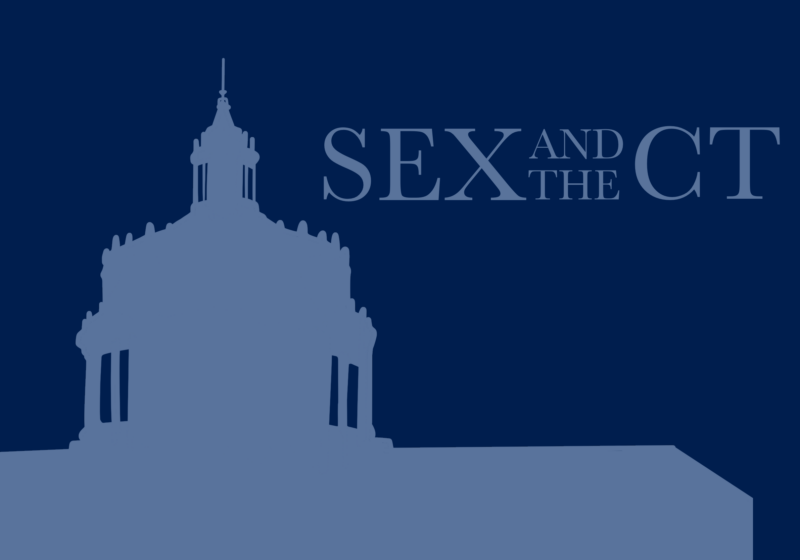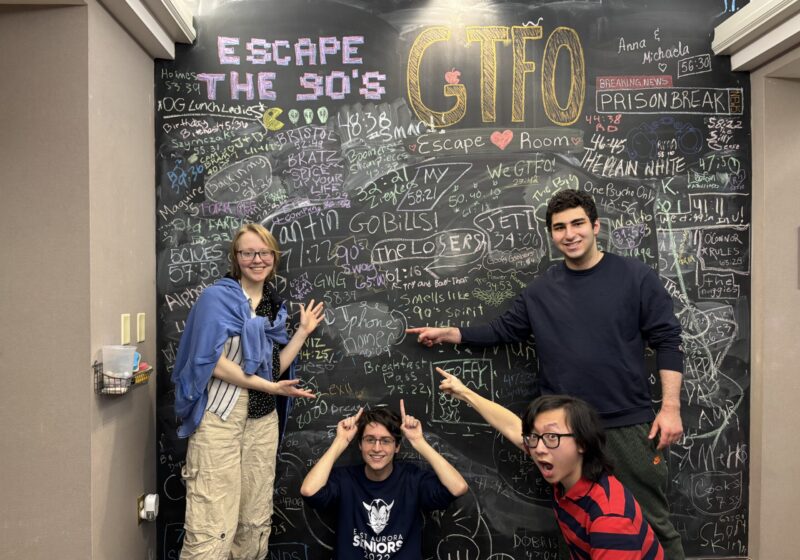My name is Joy Getnick and I’m the Executive Director of Hillel at the University of Rochester. You might recognize my name because I am one of the people featured on the ‘wanted’ posters. In conversations on campus, I have learned that it can be hard for some to understand the impact of what was done. In the spirit of centering the experiences of the people most impacted, and learning to listen across differences, I thought it might be helpful if I shared my experience as one of the “wantees.”
I do want to be clear that I am sharing my experience and how I have perceived the impact of that experience on our Jewish student community. I certainly cannot speak for all UR Jews, but given my role on campus, and the great extent of our relationships and reach, I do feel that what I am to share reflects the majority of Jewish students’ reactions to me being targeted in this way. I would encourage Jewish students to also share their individual experiences and impact as they wish. I am concerned that I am hearing that many students don’t feel comfortable openly sharing, and that is all the more reason I need to model speaking up against hate, even if it makes me more vulnerable in the public eye.
I also want to extend support and strength to the others who were targeted by this hateful campaign, whether they are University administrators and leaders or fellow Jewish faculty and staff. I am sure each of our experiences was a bit different. This was mine.
A bit about me: I’m a proud third-generation UR graduate (B.A. ’06) and a fifth-generation Jewish Rochesterian. I initially thought I’d teach in academia, and went on to earn a Ph.D. in history elsewhere. Yet my Jewish community volunteer work was quickly turning into an unexpected career path, and I am so proud to say I have been “professionally Jewish” for almost 20 years.
One of the reasons I most love working for Hillel, the face of inclusive Jewish life on campus, is that it is what is called a “pluralistic” Jewish organization. That means that instead of promoting specific ideas about how one should be Jewish, we proudly welcome all kinds of Jews, and all kinds of Jewish, to celebrate the diversity of Jewish heritage and practice together.
UR Hillel is also a Zionist organization, in a classical sense. By that, I mean that the organization upholds the right of Israel to exist as a Jewish state on ancient Jewish land, alongside all global nation-states, many of which have a national ethnicity or religion. It in no way precludes there also being an independent Palestinian state. Hillel has no commentary on the borders, politics, or policies of the state of Israel itself, and there is great diversity of opinion within UR Hillel students about Israeli policies and their relationships with Israel as American Jews. All kinds of Jews; all kinds of Jewish.
In fact, on Sunday evening, Nov.10, I helped facilitate an intra-Hillel community conversation with an organization called Resetting the Table about how we as Jews speak to and about each other, re: Israel. If we truly want to be a place where all kinds of Jews feel authentically welcome, we need to learn how to listen across differences and practice what it means to be in a diverse community. That takes work. I left the program that evening thinking, “Wow — how fortunate I am to be working with such thoughtful students in such meaningful ways.”
And then, I learned about the posters.
Initially, it seemed only me and a few others were targeted. I immediately noticed that all the faculty and staff were Jewish. I looked at the poster of me. I looked at the language used, and the nature of the entirely untrue accusations, and I thought, “This can’t be happening. Am I the victim of an antisemitic crime?”
Although I shouldn’t have to defend myself, I feel I need to explain why these accusations are untrue. First, Modi’in is a city within the state of Israel, not a settlement in the West Bank. I’m part of a Jewish peoplehood partnership where my last contribution before this incident, earlier that weekend in fact, was to help make a connection between a Modi’in effort to start group homes for young adults with autism with similar programs here in Rochester that could provide expertise. Second, as many Hillel students and University colleagues can attest, the statement about my view of protestors is simply untrue.
The poster also plays into harmful antisemitic trope language about Jews. Accusing me of racism and intimidation plays into the antisemitic stereotype that Jews are all-powerful, and of whatever opposing race one wants us to be. In Germany, Jews were regarded as powerful non-white others. Some in the United States (such as those who marched in the Charlottesville “Unite the Right” rally in 2017) still see Jews that way — as powerful non-white others looking to “replace” good white Americans, while others see us as part of a white power structure responsible for societal oppression. Here at UR, the antisemitic tropes on the poster have historically been used against me when I strive to educate about Jewish peoplehood and antisemitism as an advocate for my community.
I fully agree that it is not antisemitic to critique Israeli policy. American Jews and Israelis do this all the time. I also agree that, of course, one has a right to disagree with UR Hillel’s view on Israel or Zionism, or with me personally. But that isn’t what this is. The poster reflects a fictitious person and ideas people seem to have about her. I rarely share my opinions on Israeli policy because my role in Hillel is to uplift student opinions, not to share my own. UR Hillel interacts with hundreds of Jewish students every year in all kinds of ways. When someone targets me, they target me in my role, which targets Hillel. This impacts Jewish students and hurts the ability for Jewish student life on our campus to fully thrive. It is disgraceful, abhorrent, and harmful.
But I am also a person, with a family, who lives in this community. I know that the things said about me on that poster aren’t true, but people believe what they read. I needed to call my children’s school and tell them that mom was on a fictitious ‘wanted’ poster with literally hundreds of thousands of views on X (formerly Twitter), and in the international press. As educator and influencer Hen Mazzig noted, what were students meant to do when they found the people on these signs? I had to start working with security professionals to assess the potential risk of me attending Hillel events on campus, which hurts my ability to fully serve Jewish students, and plan out where I was going to be. While I am grateful that there are no known threats to me, or anyone targeted, and I hope that doesn’t change, I still had to stop and think — “Am I safe at my job? Am I safe in my home?” It is one thing to target ideas; it is another thing to target people.
It is particularly egregious, dangerous, and antisemitic to target people because they are Jewish. My involvement in the partnership with Modi’in has nothing to do with my work for Hillel. It is part of my personal, outside-of-work Jewish identity and strong commitment to global Jewish peoplehood. Many of these partnerships include European cities and Jewish communities, as has been explored by ours locally, because this isn’t about Israel — it’s about being Jewish. I was targeted because I am Jewish, personally and professionally. If that isn’t antisemitism, what is?
I am so sad for all the Jewish students who deeply felt the impact of this poster campaign, and knew in their hearts that this was what antisemitism looks like and feels like the moment they saw those posters targeting Jewish faculty and staff — and me. I am so sad for all students who were impacted in any way, distracted from the core work of learning, research, and growth we are all here to do at an institution I love.
I am also sad because I believe a university is a place to have important, high-level conversations about global issues such as the war, prospects for Palestinian independence, settlements, etc. Our Hillel’s Oct. 7 offerings included opportunities to learn, mourn, and reflect on the horrific terrorist attack by Hamas. And the next day, on Oct. 8, we hosted experts in international diplomacy to share their first-hand insights on how we could chart a better path forward for both Israelis and Palestinians. That was the programming we as Hillel chose to put out into the world — a hope for a better tomorrow for everybody. These posters don’t further those conversations. In my opinion, they detract from those conversations, because now the focus is on crime and hate. It’s not in any way about centering the experiences and perspectives of Palestinians or Israelis, nor is it about elevating critical inquiry into what could be done to ensure security, dignity, mutual self-determination, and peace in the region.
Real damage has been done here. There is an old Jewish folktale, likely similar to folktales in many cultures, about how a lie is like opening a feather pillow into the wind. People believe what they read, and they share what they read. The feathers spread everywhere, and try as one might, they can never all be collected again. Long after this incident is over, long after current students have graduated, there will still be times when someone says something about the Hillel director and others think, “Oh, there’s an issue with her.” They might remember the specific accusations. They might not. But they will remember the impact of the antisemitic slander.
There is also real damage right now to the Jewish community at UR. It is imperative that Jewish students feel safe — not just physically safe but emotionally safe — affiliating with and being in campus Jewish spaces. When Hillel is targeted, Jewish students who value what Hillel offers them and our campus community are harmed. We need to do better.
I hope that this is an opportunity for deep reflection on how we got to this moment and who we want to be going forward. I hope this is an opportunity to instill meaningful education about Jewish peoplehood and antisemitism into all walks of University life — for students, faculty, and staff. I hope that this is an opportunity for significant change in how we think and talk about Jewish identity and lived experiences at UR in 2024.
It is notable that so many winter holidays feature light. One of the things I love most about Chanukah is the requirement to light one’s own light. It is not enough to watch someone else light the candles — we must also light our own to add our unique light to the world. I hope each one of us reflects on what it would mean to add our light now — to listen, to learn, to reflect — and then to do the work that is needed so that Jewish life, alongside diversity of all kinds, can fully thrive both here at UR and everywhere. In that way, perhaps we can together turn this painful, hateful situation into a spark for lasting good.




